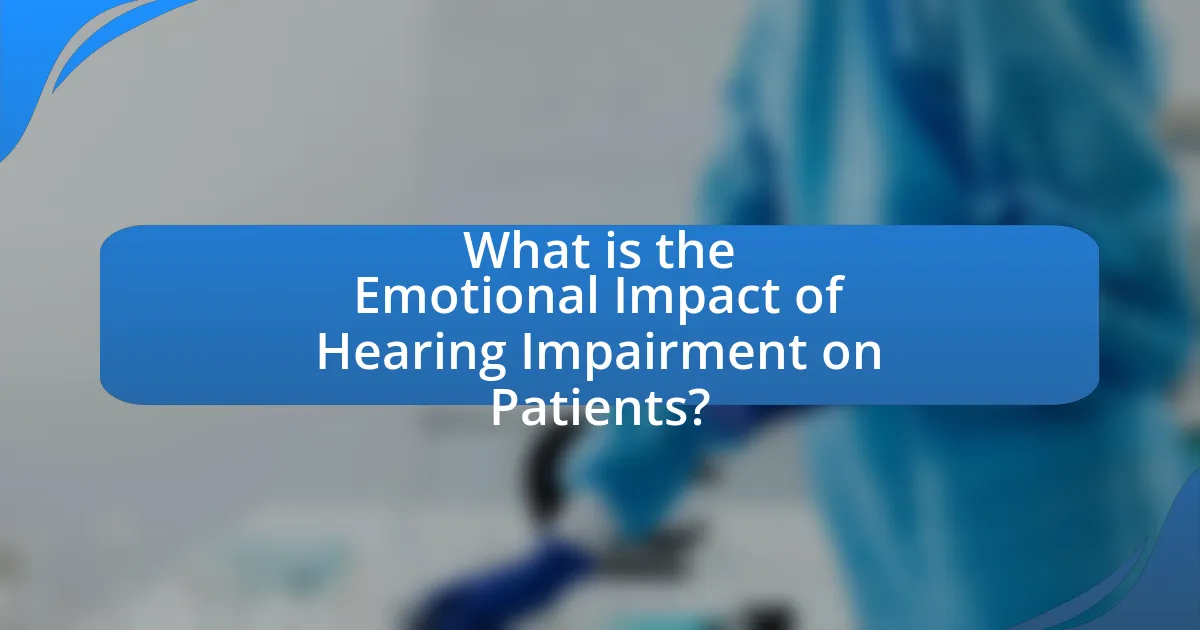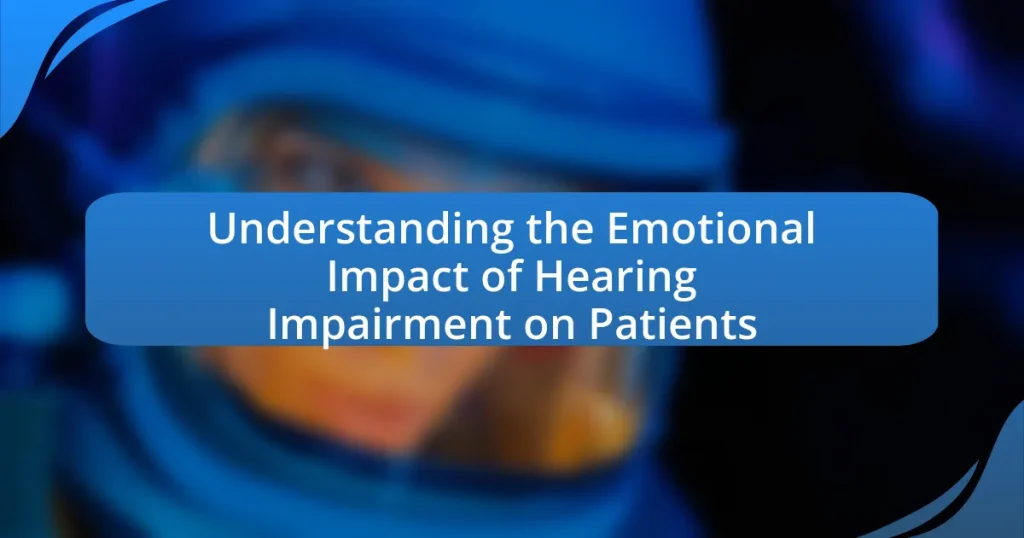The article focuses on the emotional impact of hearing impairment on patients, highlighting how this condition can lead to feelings of isolation, frustration, and anxiety. Research indicates that individuals with hearing loss often experience a decline in social interactions, which exacerbates loneliness and depression. The article discusses the emotional challenges faced by different age groups, the importance of understanding these emotional impacts for healthcare providers, and strategies to support emotional health, including counseling, support groups, and cognitive behavioral therapy. It emphasizes the role of empathy in patient care and the long-term consequences of untreated hearing impairment on mental health.

What is the Emotional Impact of Hearing Impairment on Patients?
Hearing impairment significantly affects patients emotionally, leading to feelings of isolation, frustration, and anxiety. Research indicates that individuals with hearing loss often experience a decline in social interactions, which can exacerbate feelings of loneliness and depression. A study published in the Journal of the American Geriatrics Society found that older adults with hearing impairment are more likely to report depressive symptoms compared to those with normal hearing. Furthermore, the inability to communicate effectively can lead to increased stress and a diminished quality of life, as patients struggle to engage in conversations and social activities.
How does hearing impairment affect emotional well-being?
Hearing impairment negatively affects emotional well-being by increasing feelings of isolation, anxiety, and depression. Individuals with hearing loss often struggle to communicate effectively, leading to social withdrawal and a diminished sense of belonging. Research indicates that approximately 30% of adults with hearing loss experience significant emotional distress, as highlighted in a study published in the Journal of the American Academy of Audiology, which found a strong correlation between the severity of hearing loss and increased levels of anxiety and depression. This emotional impact can further exacerbate the challenges faced in daily life, creating a cycle of emotional and social difficulties.
What specific emotions do patients commonly experience?
Patients commonly experience emotions such as frustration, anxiety, sadness, and isolation due to hearing impairment. These emotions arise from challenges in communication, social interactions, and the overall impact on daily life. Research indicates that individuals with hearing loss often report feelings of helplessness and a decline in self-esteem, which can exacerbate their emotional distress. For instance, a study published in the Journal of the American Academy of Audiology found that 60% of participants with hearing loss experienced significant levels of anxiety and depression, highlighting the emotional burden associated with this condition.
How do these emotions vary among different age groups?
Emotions related to hearing impairment vary significantly among different age groups. Younger individuals often experience frustration and anxiety due to social isolation and communication barriers, while middle-aged adults may feel a mix of frustration and sadness as they navigate professional and personal relationships affected by their hearing loss. Older adults typically experience feelings of loneliness and depression, as they may face increased social withdrawal and a sense of loss regarding their independence. Research indicates that emotional responses to hearing impairment are influenced by factors such as social support, coping mechanisms, and the degree of hearing loss, highlighting the need for age-specific interventions to address these emotional challenges effectively.
Why is understanding emotional impact important for healthcare providers?
Understanding emotional impact is crucial for healthcare providers because it directly influences patient outcomes and satisfaction. When healthcare providers recognize the emotional challenges associated with conditions like hearing impairment, they can tailor their communication and support strategies effectively. Research indicates that patients who feel understood and supported emotionally are more likely to adhere to treatment plans and report higher satisfaction levels. For instance, a study published in the Journal of the American Academy of Audiology found that addressing emotional concerns significantly improved the quality of life for individuals with hearing loss. Thus, understanding emotional impact enhances the overall effectiveness of care and fosters a more empathetic healthcare environment.
How can emotional understanding improve patient care?
Emotional understanding can significantly improve patient care by fostering stronger patient-provider relationships and enhancing communication. When healthcare providers recognize and empathize with the emotional states of patients, particularly those experiencing hearing impairment, they can tailor their interactions to meet individual needs, leading to increased patient satisfaction and adherence to treatment plans. Research indicates that empathetic communication can reduce anxiety and improve health outcomes, as patients feel more valued and understood. For instance, a study published in the Journal of General Internal Medicine found that patients who perceived their physicians as empathetic reported higher satisfaction and were more likely to follow medical advice. Thus, integrating emotional understanding into patient care practices is essential for optimizing health outcomes and overall patient experience.
What role does empathy play in treating hearing-impaired patients?
Empathy plays a crucial role in treating hearing-impaired patients by fostering effective communication and building trust between healthcare providers and patients. When healthcare professionals demonstrate empathy, they can better understand the emotional and psychological challenges that hearing-impaired individuals face, such as feelings of isolation and frustration. Research indicates that empathetic interactions can lead to improved patient satisfaction and adherence to treatment plans, as patients feel more valued and understood. For instance, a study published in the Journal of the American Academy of Audiology found that patients who perceived their audiologists as empathetic reported higher levels of satisfaction with their care. Thus, empathy not only enhances the therapeutic relationship but also positively impacts the overall treatment outcomes for hearing-impaired patients.
What are the long-term emotional consequences of hearing impairment?
Long-term emotional consequences of hearing impairment include increased feelings of isolation, anxiety, and depression. Individuals with hearing loss often struggle to communicate effectively, leading to social withdrawal and a diminished sense of belonging. Research indicates that approximately 30% of people with hearing impairment experience significant depressive symptoms, as highlighted in a study published in the Journal of the American Geriatrics Society by Lin et al. (2011). Additionally, the inability to engage in conversations can exacerbate feelings of frustration and helplessness, further impacting mental health.
How does chronic hearing loss influence mental health?
Chronic hearing loss significantly influences mental health by increasing the risk of depression, anxiety, and social isolation. Research indicates that individuals with hearing impairment often experience difficulties in communication, leading to feelings of frustration and withdrawal from social interactions. A study published in the Journal of the American Geriatrics Society found that older adults with hearing loss were 1.4 times more likely to experience depression compared to those with normal hearing. Additionally, the World Health Organization highlights that untreated hearing loss can lead to cognitive decline and reduced quality of life, further exacerbating mental health issues.
What are the risks of social isolation for hearing-impaired individuals?
Social isolation poses significant risks for hearing-impaired individuals, including increased feelings of loneliness, depression, and anxiety. Research indicates that individuals with hearing loss are more likely to experience social withdrawal, which can exacerbate mental health issues. A study published in the Journal of the American Geriatrics Society found that older adults with hearing impairment are at a higher risk of developing cognitive decline and dementia, with social isolation being a contributing factor. Furthermore, the National Institute on Deafness and Other Communication Disorders highlights that social engagement is crucial for emotional well-being, and the lack of communication can lead to a diminished quality of life.
How can we transition from understanding to addressing emotional needs?
To transition from understanding to addressing emotional needs, it is essential to implement targeted interventions based on the insights gained from understanding those needs. This involves actively listening to patients, validating their feelings, and creating personalized support plans that address their specific emotional challenges related to hearing impairment. Research indicates that when healthcare providers engage in empathetic communication and provide tailored resources, patients report improved emotional well-being and satisfaction with care. For instance, a study published in the Journal of the American Academy of Audiology found that patients who received emotional support alongside their treatment for hearing loss experienced a significant reduction in anxiety and depression levels.
What strategies can be employed to support emotional health in hearing-impaired patients?
To support emotional health in hearing-impaired patients, strategies such as providing access to counseling services, fostering social connections, and utilizing assistive technology can be employed. Counseling services offer a safe space for patients to express their feelings and cope with the emotional challenges associated with hearing loss. Research indicates that social isolation is prevalent among hearing-impaired individuals, so encouraging participation in support groups can enhance their sense of belonging and reduce feelings of loneliness. Additionally, assistive technology, such as hearing aids and communication apps, can improve communication, thereby reducing frustration and anxiety related to social interactions. These strategies collectively contribute to better emotional well-being for hearing-impaired patients.
What specific interventions can help mitigate emotional distress?
Cognitive Behavioral Therapy (CBT) is a specific intervention that can help mitigate emotional distress in patients with hearing impairment. CBT focuses on identifying and changing negative thought patterns and behaviors, which can reduce feelings of anxiety and depression associated with hearing loss. Research indicates that CBT can lead to significant improvements in emotional well-being, as evidenced by a study published in the Journal of Clinical Psychology, which found that participants experienced a 50% reduction in depressive symptoms after undergoing CBT. Other effective interventions include support groups, which provide social support and shared experiences, and mindfulness practices, which have been shown to decrease stress and improve emotional regulation.
How can counseling and therapy benefit hearing-impaired patients?
Counseling and therapy can significantly benefit hearing-impaired patients by addressing their emotional and psychological challenges. These services provide a supportive environment where patients can express feelings of isolation, frustration, or anxiety related to their hearing loss. Research indicates that hearing impairment often correlates with increased rates of depression and social withdrawal; thus, therapeutic interventions can help mitigate these effects by fostering coping strategies and enhancing communication skills. For instance, a study published in the Journal of Deaf Studies and Deaf Education found that counseling improved the overall mental health and social engagement of hearing-impaired individuals, demonstrating the effectiveness of these therapeutic approaches in promoting emotional well-being.
What role do support groups play in emotional recovery?
Support groups play a crucial role in emotional recovery by providing a safe space for individuals to share experiences and feelings related to their challenges. These groups foster a sense of belonging and reduce feelings of isolation, which is particularly important for those dealing with hearing impairment. Research indicates that participation in support groups can lead to improved emotional well-being, as members often report increased self-esteem and reduced anxiety. A study published in the Journal of Deaf Studies and Deaf Education found that individuals who engaged in support groups experienced significant improvements in their emotional health, highlighting the effectiveness of peer support in the recovery process.
What practical tips can healthcare providers use to support patients emotionally?
Healthcare providers can support patients emotionally by actively listening to their concerns and validating their feelings. This approach fosters a sense of trust and understanding, which is crucial for patients experiencing emotional distress related to hearing impairment. Research indicates that effective communication, including the use of clear language and visual aids, enhances patient engagement and reduces anxiety (American Speech-Language-Hearing Association, 2020). Additionally, providers should encourage patients to express their emotions and provide resources for counseling or support groups, as these can significantly improve emotional well-being.


